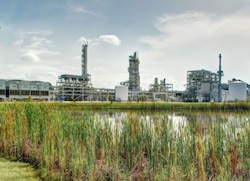INEOS Bio’s biorefinery, Indian River BioEnergy Center, is now producing cellulosic ethanol at commercial scale. The first ethanol shipments will be released in August. According to the company, this is the first commercial-scale production in the world using their gasification and fermentation technology for conversion of biomass waste into bioethanol and renewable power.
“We are delighted with the progress made by our team at Vero Beach,” said Peter Williams, CEO of INEOS Bio and Chairman of INEOS New Planet BioEnergy. “They have successfully addressed the challenges of moving a new technology to large production  scale for the very first time. Consequently, we are now pleased to announce that we are producing commercial quantities of bioethanol from vegetative and wood waste, and at the same time exporting power to the local community – a world first. We expect to spend the remainder of 2013 putting the plant through its paces, and demonstrating full nameplate capacity.”
scale for the very first time. Consequently, we are now pleased to announce that we are producing commercial quantities of bioethanol from vegetative and wood waste, and at the same time exporting power to the local community – a world first. We expect to spend the remainder of 2013 putting the plant through its paces, and demonstrating full nameplate capacity.”
Dr. Williams added, “All that we have seen so far validates the technical and economic viability of the technology. We remain convinced that the ability to divert waste materials from communities by converting them into competitively priced renewable fuel and power offers an excellent value proposition. It helps solve waste disposal issues, contributes to the supply of affordable and renewable fuel and energy, creates attractive jobs, and provides a sustainable source of value for the community. We look forward to taking the next steps in building a global business based on the broad deployment of this advanced technology.”
The BioEnergy Center is a joint venture project between INEOS Bio and New Planet Energy. The facility has already converted several types of waste biomass material into bioethanol, including vegetative and yard waste, and citrus, oak, pine, and pallet wood waste. It will have an annual output of eight million gallons (24kta) of cellulosic ethanol and six megawatts (gross) of renewable power. The Center is also permitted to utilize municipal solid waste (MSW), quantities of which will be used for bioethanol production at the Center during 2014.

